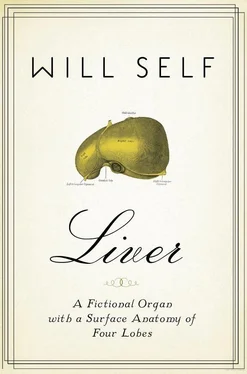Billy lunged up in the bath, in time to hear ‘—king door!’ in the calm after the splash. Then he was all action: out on the wet lino, twisting a thin towel round his nethers, then into the corridor. He knelt over Tony. ‘All right, mate? Y’all right, mate?’ A ghastly simulation of Cockney mummy concern.
‘Juss, juss, juss — ’ Tony shudderingly inhaled, then sputtered, ‘Get the fucking door.’
Calcium hydroxide, calcium chloride, calcium hypochlorite. In a word: bleach. We don’t altogether fear it — there are too many of us, and we’re too small. Far too small. I’m small even for my kind — maybe fifty nanometres across, which is fifty billionths of a metre. That’s smaller than the wavelength of visible light, so why should I fear bleach? For I can have no colour. Anyway, Georgie doesn’t apply bleach to the insides of syringes or spoons, nor does she dunk razors or toothbrushes in it. All her bleaching activities are confined to the laminated surfaces of Tony Riley’s kitchen. In the days when the disorder in her life was a tea mug unwashed up for the odd hour, or a book left face down on the arm of a chair, Georgie used to say, ‘It doesn’t matter how messy things get so long as you have clean kitchen surfaces.’
Of course, that was when things weren’t really messy at all. That was during the eight clean years, when Georgie attended her self-help groups, built a career as a television producer, had a couple of happy-then-unhappy relationships, visited her parents, paid her taxes. That was before the craters full of sepsis and the shrinking of her head; that was when she had her own studio flat in Chiswick, not two black plastic bags in the dark corner of Tony Riley’s damp bedroom.
Now the clean kitchen surfaces were the only ordered thing in the mess that was notionally her life. After cooing, billing and heaving Tony back to his oxygen cylinder, Georgie adjusted her dressings — fallen down around her ankles, obscene crêpe parodies of old women’s stockings — before setting to with bucket, hot water, brush and bleach. She didn’t stop until the Formica was lustrous and the aluminium draining board gleamed.
Shitty disease, emphysema. Admirably shitty: chronic, progressive, degenerative — a bit like civilization. And here we have the gerontocracy of late capitalism that Sam Beckett — himself a sufferer — would undoubtedly have recognized. With their faces — one browned by neglect, the other blued by anoxia — Georgie and Tony were typecast as Nell and Nagg. He nagged her, wheezing demands, while she nellied about the flat, fetching his anti-cholinergics and bronchodilators, administering his steroids and checking the levels on his oxygen cylinder. Setting to one side the ghastliness of a carer almost as sick as her patient, there was a ritualized and stagy desperation to their relationship; because, of course, there is no more painkiller, the little round box is empty , and everything is winding down .
Yes, a stagy desperation heightened only by their cloying affection and their treacly endearments: Chuckle-Bunny, Sweetums, Little Dove, Ups-a-Boy and Noodly-Toots for each other; and for the drugs: smidgen, pigeon, widgeon and snuff-snuff. To behold them, passionately engaged in the chores of moribundity, was to intrude upon the intimacy of a couple so old, so long together, so time-eroded into a single psychic mass, that they seemed ancient enough to have had children that must’ve grown up, gone away, formed partnerships of their own, had their own children, grown older, then themselves died. Of old age.
Tony was fifty-three, Georgie forty-one. They had known each other for six months.
From time to time, Georgie would break out of her stagy desperation and peremptorily order Billy to fetch this or do that. This may have been a ship of fools, but it was a tight one. There was no room on deck for shirkers. Billy had shed his moist breech-clout in favour of a neatly pressed tan linen suit, white shirt and red tie — perfect protective colouring for a hapless Indian actor attending a Hollywood party. The ‘plink-plink-brill-ll-llerowng!’ of his sitar had snagged the twang of an electric guitar; now a snare drum brushed up the tempo, as Billy, in a dinky three-wheeler car, pulled out of the driveway and buzzed off down the boulevard lined with palms. It was an iconic image of Los Angeles, undercut, if only he knew it. Ach! Fuck it! If only he knew anything ; and if only he didn’t behave as if his entire life were a pre-credit sequence.
Because here it was: Ars Gratia Arts captioned a lion roused from torpor and petulantly roar-yawning. But a better motto for Billy would’ve been Pro Aris et Focis ; for, as he piloted the joke car of his narcotized psyche down the corridor of Tony Riley’s flat — a boulevard lined with the drooping fronds of old advertising flyers and press releases, the domesticated foliage of Tony’s once wildly successful career in public relations — Billy was reverencing his deity and preserving this hearth.
The order of the credits for the production was this: Tony, the hotshot producer whose mortgage arrears couldn’t now catch up on him before the repossession of Death. He had the De Vere Gardens flat and a few more quid in the bank to chuck on the pyre. Every day he re-erected the set upon which the film of the party was shot — but he couldn’t do it without Georgie. Georgie was the director: she assembled cast and crew, rehearsed their lines, consulted with script editors and cameramen — without her there would’ve been no action. Since her legs had started to rot — abscesses from shooting up, did you really want to know? — she could no longer act as a runner for a different production, the big one, overseen by Bertram and Andy’s crew.
Then there was Billy, who lived from hand to hand — because his mouth rarely entered into it. He gofered for Tony and Georgie in return for wheedling rights on the drugs that flowed through the gross anatomy of the flat. Billy, most weeks, couldn’t even get it together to go to pick up his emergency payment from the social in Euston. So, no leech, but by default an exemplary sole trader, engaged in the arbitrage of small quantities of merchandise, while offering piffling services. He probably should have received an Enterprise Allowance — or a British Screen grant.
*
At the venue for the party, the capacious and ugly modern home of capacious and ugly Hollywood film producer Fred Clutterbuck, Billy manoeuvred Hrundi V. Bakshi’s three-wheeler between two ordinary-sized cars, and then had to climb out the top because he couldn’t open the door. In this, Peter Sellers was only aping many episodes in Billy’s own life: the insinuation of his simian body into spaces it wasn’t intended for — tiny toilet windows, constricted shafts, tight transoms; and places where it wasn’t wanted — nice teenage girls’ bedrooms, the locked premises of chemists’.
The Clutterbucks’ front door was answered by a uniformed black maid. Beyond her stretched a long hallway, with a walkway running over an artificial stream that flowed alongside a bamboo screen. When Billy was a kid, it was the insane largesse of this interior rill that made of the Clutterbucks’ home — or, rather, Blake Edwards’s production designer’s conception of the Clutterbucks’ home — a domestic pleasure dome. (Fernando Carrere, died 1998.)
It might be surmised that with age and experience any child would be disabused of this impression by other, more stylish domains, so that, upon reviewing The Party , he would wince at the tackiness of it all: the painted plywood cladding on the walls, the funnel-like light fitments, the circular fireplace — all of which were to be travestied, and travestied again during the next two decades, until such ‘features’ ended up skulking in chain hotels by motorway intersections, on the outskirts of a thousand cities that no one chooses to visit. Not to mention the stream itself, which was no Alph but a mean little trough, its bottom and sides painted with durable, aquamarine paint.
Читать дальше












